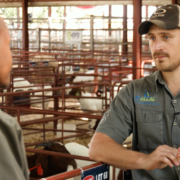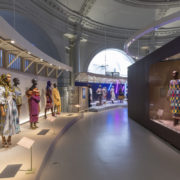Afreximbank appoints Kanayo Awani EVP, Intra-African Trade Bank
This notice is designed to provide you with more information about how New African Woman Magazine uses cookies.
New African Woman Magazine regularly review this Cookie Notice to best reflect the technology that we use on our websites.
WHAT ARE COOKIES?
“Cookies” are small files that contain information that a website sends to your computer, laptop or mobile media device’s hard drive while you are viewing a website. Each cookie is unique to your web browser and will contain some anonymous information such as unique identifier and the site name and some digits and numbers. It allows a website to remember things like your preference or what’s in your shopping basket.
How does New African Woman Magazine use cookies?
Cookies are used by lots of websites to provide features to their users and they are used by New African Woman Magazine to improve its websites and to deliver a better and more personalised and interactive service to you.
New African Woman Magazine also uses persistent cookies, which stay on your computer or mobile media device even after you have gone offline.
New African Woman Magazine will use different types of cookies at various different pages of your use of our websites, these types of cookies include:
1. FUNCTIONALITY COOKIES
These are essential to the running of New African Woman Magazine website. They include Session cookies, which enable you to carry out essential functions onNew African Woman Magazine websites like maintaining login details for the session or a transaction. Session cookies are not stored on your computer and the information these cookies collect is anonymised and they cannot track your browsing activity on other website. These cookies will expire when you close your web browser session.
Cookies defined, as ‘Functionality’ will not be used to target you with adverts on other websites.
2. STRICTLY NECESSARY COOKIES
These cookies allow you to move around our websites and use essential features like secure areas and shopping baskets. These cookies do not gather any information about you that could be used for marketing or remembering where you have been on the internet.
Cookies defined, as ‘Strictly Necessary’ will not be used to target you with adverts or remember your preference or username beyond your current visit.
3. PERFORMANCE COOKIES
These cookies collect information about how you use our website, such as which pages you visit. These cookies do not collect any information that could identify you, as all the information collected is anonymous and is only used to help us improve our websites, understand what interests you and measures how effective our advertising is.
Cookies defined, as ‘Performance’ will not be used to target you with adverts or target adverts to you on other websites, or remember your preference or username beyond your current visit. We use these cookies to understand how our website is performing to enable us to make improvements to enhance your browsing experience.
4. TARGETING COOKIES
These cookies are linked to services provided by third parties. We use these cookies for social media sharing; providing advertising agencies with information on your visit so that they can show you adverts that you may be interested in when you return to the website or visit other third party websites and deliver content and marketing communication which are tailored to your interests based on you your visit. We also enable some advertising partners to set cookies specifically to enable them to analyse advertising campaign performance.
THIRD PARTY COOKIES
To learn more about the cookies and providers on our sites – click here
a) Third party cookies for advertising. Many of our websites carry advertising. A certain amount of this advertising is tailored to the individual user, as practice known as “Online Behavioral Advertising” which uses cookies to discover general information about the pages you visit. This keeps many of our websites and services you use free of charge. The tracking system is anonymised and therefore it does not know who you are; it simply uses the limited information available to it to serve adverts to you, which it believes are relevant. It does not collect personal information such as your name, email address postal address or telephone number.
From time to time, New African Woman Magazine may share this anonymised behavioural data with our advertising partners. This could mean that when you are on other websites you are served advertising based on your behaviour across oour titles or you may be served advertising based on your behaviour on other sites.
Behavioural retargeting is another form of Online Behavioural Advertising that enables us and some of our advertising partners to show you adverts based on browsing patterns and interactions with the site away from our sites. For example, if you have visited the website of Car Dealership you may start seeing adverts from that same Dealership site displaying special offers or showing you the products that you were browsing. This allows companies to advertise to website visitors who leave their website without making a purchase.
If you want to opt out of receiving Online Behavioural Advertising this does not mean that you will no longer receive advertising when you are using our sites. It just means that the advertising you see will not be customised for you. If you would like more information about Onsite behavioural targeting and how to opt out of it, please visit www.youronlinechoices.com or you can also visit http://www.networkadvertising.org/
Our websites uses JavaScript to detect the use of ad blocking extensions for web browsers, we do not store any information on users’ devices and process no personal data.
b) Third party cookies for tracking/user analysis. Many of our websites also use cookies to track how many individual unique users we have and how often they visit &HER MEDIA GROUP websites. We use 3rd party companies for this service such as Google Analytics provided by Google.
c) Other third party cookies. Some pages on our websites, other companies may also set their own anonymous cookies. They do this to track the success of their application, or to customise the application for you. We cannot access these cookies, nor can the other company access the data in cookies we use on our websites.
New African Woman Magazine Marketing Cookies
These are normally supplied by our approved partners or adverts delivered from New African Woman Magazine own systems and allow us to serve you adverts that you might be more interested in. This tracking system will log what adverts you see and will cap the number of times you see an advertisement. The data collected is anonymised and therefore the cookies do not know who you are.
WHAT TO DO IF YOU WANT TO CONTROL THE USE OF COOKIES?
You have the ability to accept or decline cookies when you use the website for the first time via “see all options” link on the “pop up” banner.
You also have the ability to accept or decline cookies using your web browser, but please be aware that for some parts of our websites to work you will need to accept cookies. Cookies can be removed or declined by changing your web browser settings. The following links may be helpful:
Cookie setting in Internet Explorer
Cookie setting in Microsoft Edge
For more information about third party cookies generated by advertisers please visit www.youronlinechoices.com and for general information about cookies and their use, please visit All About Cookies.
Please be aware that these are 3rd party websites and as such &HER MEDIA GROUP accept no liability for the instructions given on these sites.
If you have any questions about New African Woman Magazine policy, please contact contact@nawmagazine.com or for further legal information about privacy issues you may find The Information Commissioner’s Office useful.
Updated January 2022












